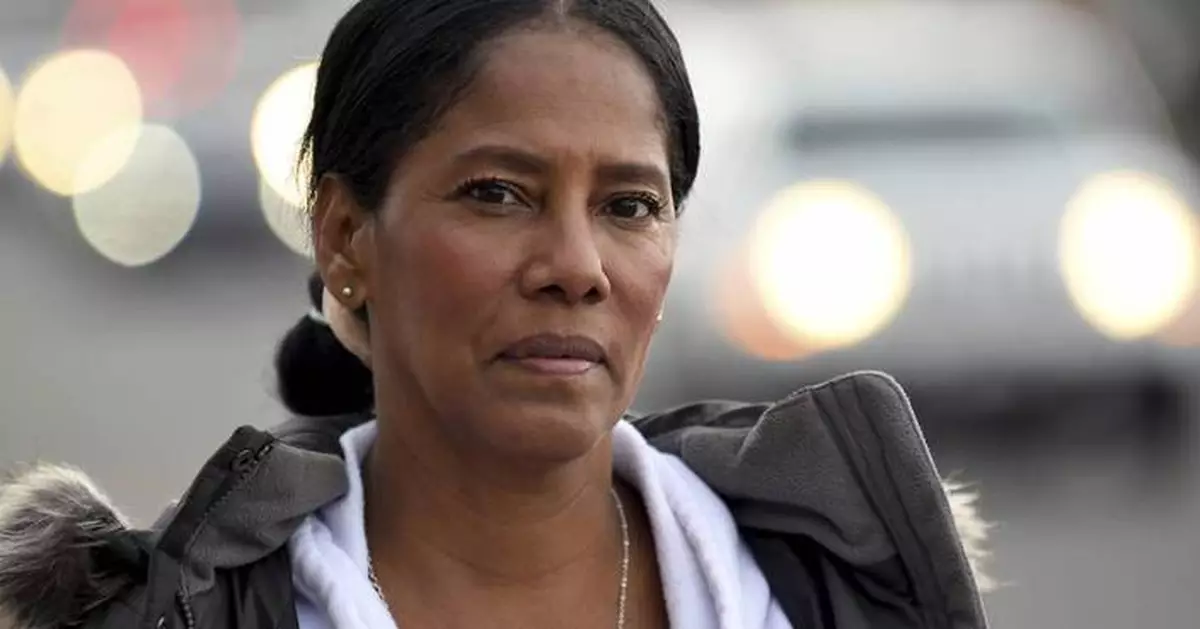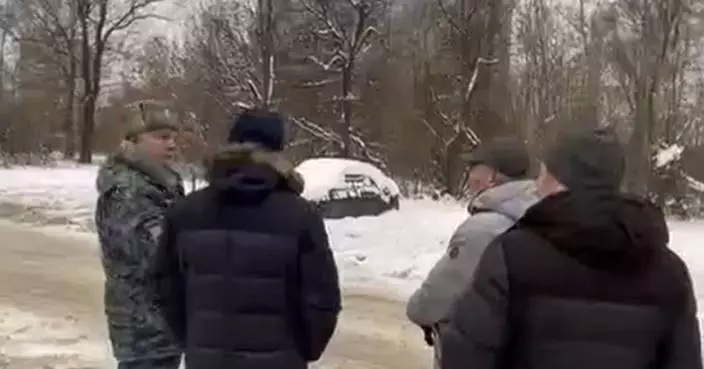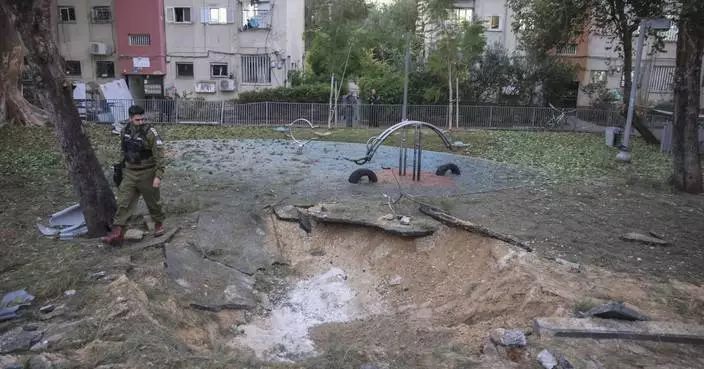AURORA, Colo. (AP) — East Colfax Avenue was the best place to find a job. That's what everyone told Sofia Roca.
Never mind the open drug use, the sex workers or the groups of other migrant women marching the sidewalks soliciting work at the very same Mexican restaurants and bakeries.
Click to Gallery
Sofia Roca packed her belongings as she prepared to leave Aurora, Colorado, on March 29, 2024. (AP Photo/Thomas Peipert)
Sofia Roca shops on East Colfax Avenue in Aurora, Colorado, on March 29, 2024. (AP Photo/Thomas Peipert)
Sofia Roca packs up to leave Aurora, Colorado, on March 29, 2024. Her roommates were headed to eviction court the next week and she didn’t know where she would go if they lost the apartment. (AP Photo/Thomas Peipert)
Sofia Roca, an immigrant from Colombia, washes clothes at a laundromat in Aurora, Colorado, on March 29, 2024. (AP Photo/Thomas Peipert)
Sofia Roca, an immigrant from Colombia, prepares to leave Aurora, Colorado, on March 29, 2024. (AP Photo/Thomas Peipert)
Sofia Roca, an immigrant from Colombia, packs up her belongings in Aurora, Colorado, on March 29, 2024, as she prepares to leave in search of work in another state. (AP Photo/Thomas Peipert)
Sofia Roca packs up her belongings on March 29, 2024. Many immigrants have been lured to Aurora, Colorado, by cheaper rent and abundant Spanish speakers, but finding a job and an affordable place to stay has been anything but easy. (AP Photo/Thomas Peipert)
Sofia Roca, an immigrant from Colombia, washes clothes at a laundromat in Aurora, Colorado, on March 29, 2024. (AP Photo/Thomas Peipert)
Sofia Roca, a 49-year-old immigrant from Colombia, climbs a stairway inside her apartment complex in Aurora, Colo., on March 29, 2024. (AP Photo/Thomas Peipert)
Sofia Roca, an immigrant from Colombia, washes clothes at a laundromat in Aurora, Colorado, on March 29, 2024. (AP Photo/Thomas Peipert)
Sofia Roca, poses for a portrait on March 29, 2024, as she prepares to leave Aurora, Colorado, in search of more reliable work in another state. (AP Photo/Thomas Peipert)
On East Colfax in Aurora, Colorado, bosses would speak Spanish and might be willing to hire someone like Roca — a 49-year-old immigrant from Colombia — without legal authorization to work. That was the rationale for going back each morning, fruitless as it was.
“Do you know how to cook Mexican food?” asked one woman when Roca inquired about a kitchen position. Roca’s accent was a giveaway: not Mexican.
“I can learn,” Roca replied in Spanish.
Responded the woman: “We’re not hiring."
As record numbers of South Americans attempt to cross the U.S. southern border, many are landing in communities that are unprepared for them — and sometimes outright hostile.
Women are leaving Colombia, and to a greater extent Venezuela, to escape starvation and violence, to provide for their children and to seek medical care. They represent some of the more than 42,000 migrants who have arrived in the Denver area over two years. Many didn’t know anyone in Denver. But it was the closest city to which Texas was offering free bus rides, both to relieve pressure on its towns and to make a political point to liberal-leaning cities about immigration’s impact on the border.
From Denver, untold numbers made their way to the suburb of Aurora, lured by cheaper rent and abundant Spanish speakers. But finding a job has been anything but easy, and women face their own particular challenges.
Last year, nearly 900,000 women and girls tried to cross the U.S. southern border, more than a fivefold increase over the last decade, U.S. Customs and Border Protection data shows. Like many of them, Roca came to the U.S. to help her children. Her adult daughter in Colombia suffers from lupus and can’t afford “the good medicines.”
After making it across the U.S. border, Roca told U.S. agents she was seeking asylum. She heard from a shelter worker in El Paso that Denver was offering migrants free housing and Texas would pay to get her there.
Roca arrived in November and stayed two weeks in a shelter. When she went looking for work along East Colfax, she observed an icy reception.
She didn't know the benefits many recent migrants have received — specifically, a path to a temporary work visa and with it better-paying jobs — were causing resentment among Aurora's large Mexican community. Many have loved ones in the country illegally or have themselves lived for years in the United States without legal permission to work.
Resentment for newcomers was building in another corner of Aurora, too — City Hall. Aurora officials in February had warned other communities against housing migrants there, vowing not to spend city money to help them. This summer, Aurora’s mayor repeated a landlord’s claim that a notorious Venezuelan gang had taken over an apartment building. Even though police say that's false, former President Donald Trump took up the claim, mentioning it at his campaign rallies. The mayor last month walked back some of his comments.
Roca never made a deliberate decision to settle in Aurora. To her, it wasn’t clear where Denver ended and Aurora began.
So when Roca's time is almost up at the Denver shelter, she does the only thing she knows to do: She heads to East Colfax in Aurora.
A man standing by his truck outside a thrift store catches her attention. He says he can help her, but not in Colorado. She can come to Kentucky with him and his family.
After more than a week of staying with the family in Kentucky, Roca learns the man's wife works in el negocio, or “the business.” There is not much work in Kentucky, so she earns her money through sex work, she tells Roca, while her kids play a few feet away.
A few days later, a Mexican man in his 30s pulls up outside the couple's trailer in a pickup truck.
He’d seen a picture of Roca and liked her — and would pay $1,000 for two nights with Roca, the wife says. Roca would keep $600, the couple would get $400.
In her month in the United States, Roca has come to understand she'll have to make sacrifices in this country. But subjecting herself to the whims of a stranger in such an intimate and vulnerable way?
“No,” she tells the woman. “I’m not going anywhere with anyone.”
The man is told to leave. The insults start immediately.
How are you going to earn money, girl? asks the woman. You’re not going to just live here for free.
Back to Aurora and East Colfax Avenue.
On most days walking along Colfax, Roca says, men would solicit her for sex, holding up their fingers to signal how many hundreds of dollars they were willing to pay.
As she looked for work in March, she came across what looked like an old motel. A man behind a plexiglass window urged her to try the bar in the back.
At a few Mexican cantinas around Aurora and Denver, “ficheras,” as the women are known in Spanish, sell beers at a markup to men and pocket the profits. It can be a fast way to earn money, but also a route to sex trafficking.
“I don’t think I have to do that yet,” Roca said. “But this street — it only offers prostitution.”
Since returning to Aurora, Roca had discovered she has few options for establishing legal residence or working legally in the U.S. She told U.S. Border Patrol officials she plans to plead for asylum at her deportation hearing, but she doubts they will grant it.
She had gotten in touch through Facebook with a friend from Colombia living in the northeastern U.S. “She’s told me she can get me a job at a hotel and I can stay with her,” she said.
Two days later, with about $80 in her pocket, Roca boarded a Greyhound bus paid for by the city of Denver. (The Associated Press is not identifying her new location. Roca is afraid the Cuban couple might seek her out after she spoke about them in the media.)
Roca’s friend followed through on her promises, connecting her to a job cleaning hotel rooms. She walks through the city with ease — and anonymously.
“It’s a huge difference from my life in Denver,” she says. “There’s less chaos, and no one has disrespected me."
She's not sure how long she'll stay. But Sofia Roca will never live in Aurora, Colorado, again.
The Associated Press’ education coverage receives financial support from multiple private foundations. AP is solely responsible for all content. Find AP’s standards for working with philanthropies, a list of supporters and funded coverage areas at AP.org.
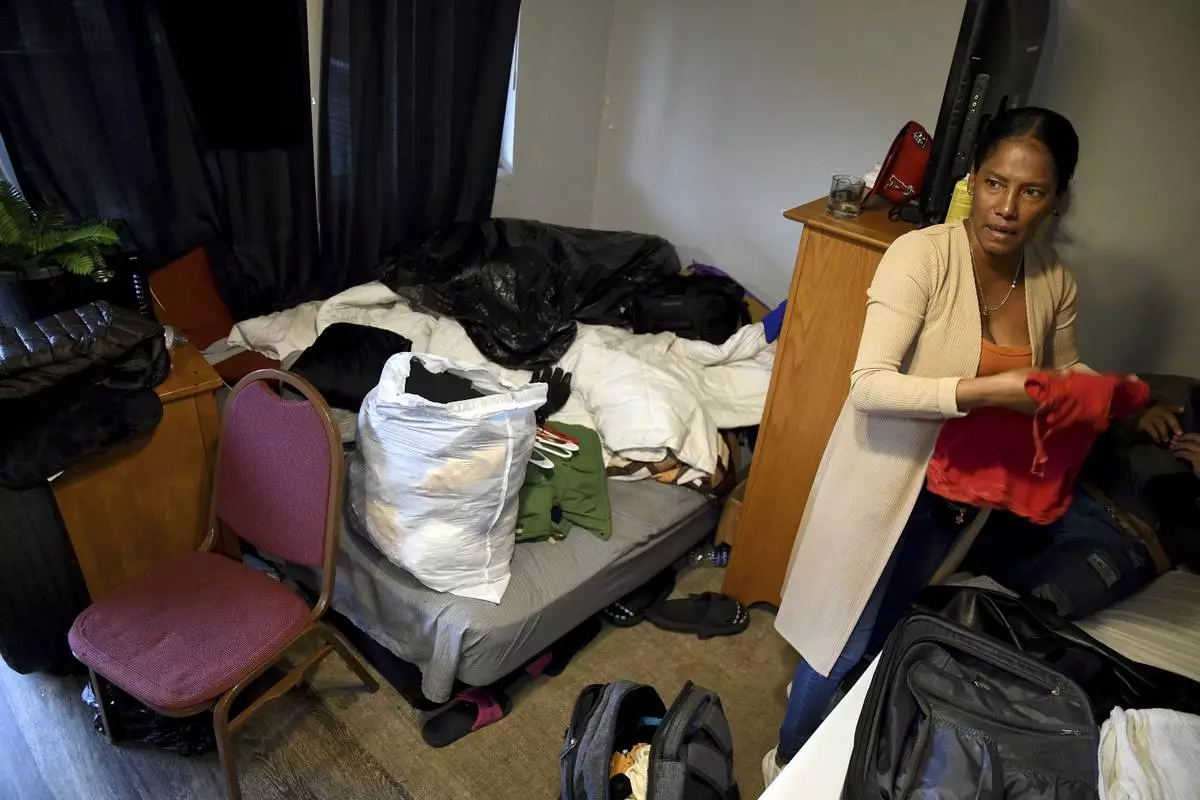
Sofia Roca packed her belongings as she prepared to leave Aurora, Colorado, on March 29, 2024. (AP Photo/Thomas Peipert)
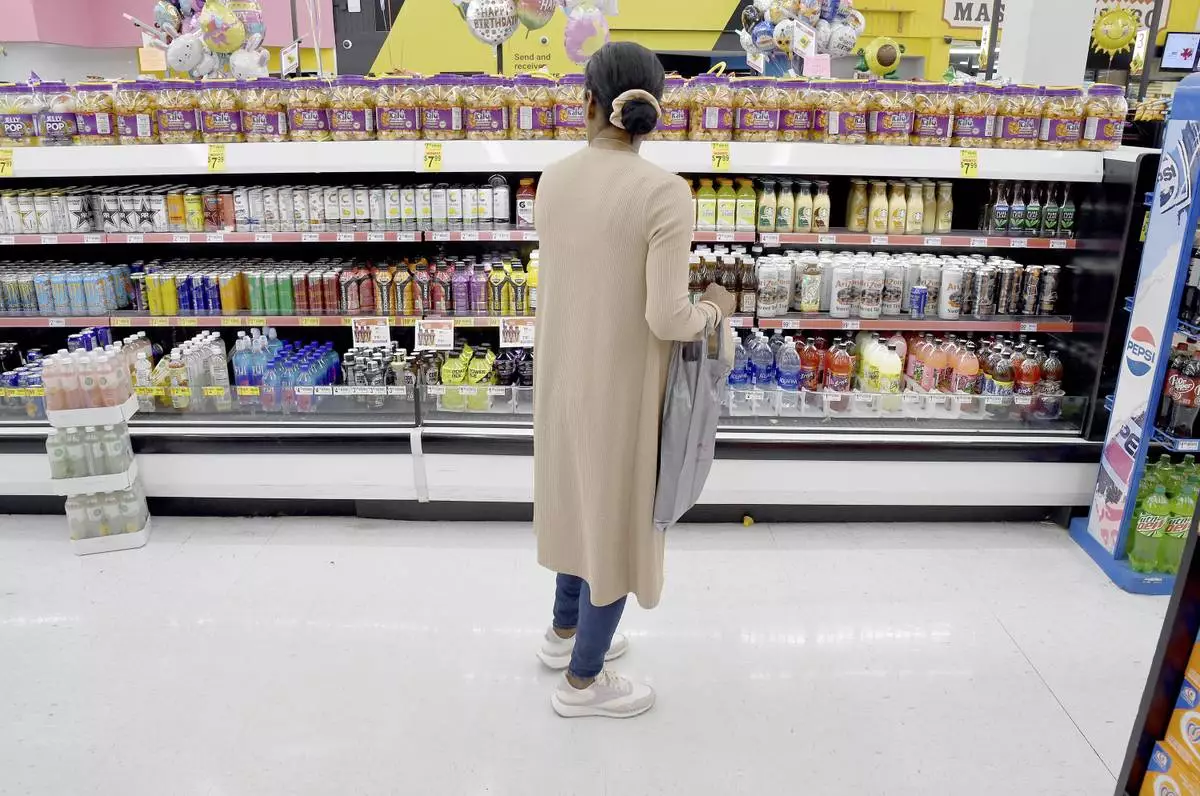
Sofia Roca shops on East Colfax Avenue in Aurora, Colorado, on March 29, 2024. (AP Photo/Thomas Peipert)
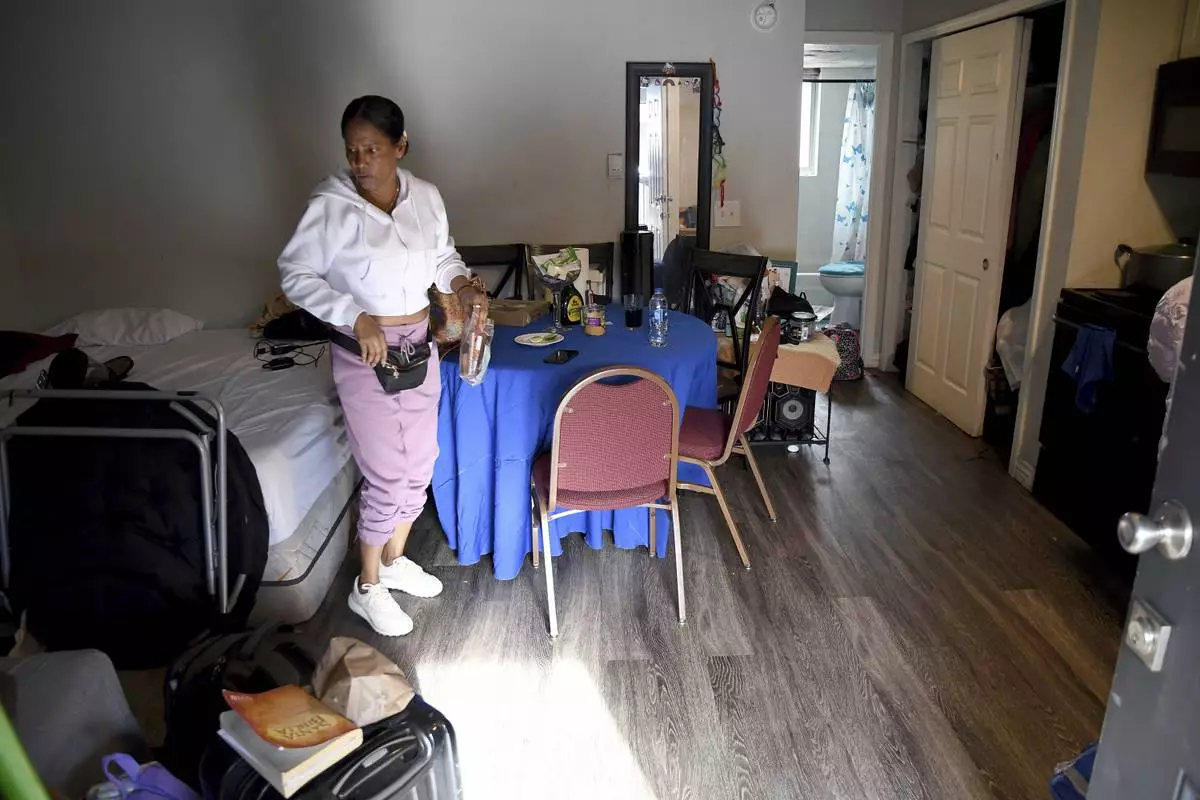
Sofia Roca packs up to leave Aurora, Colorado, on March 29, 2024. Her roommates were headed to eviction court the next week and she didn’t know where she would go if they lost the apartment. (AP Photo/Thomas Peipert)
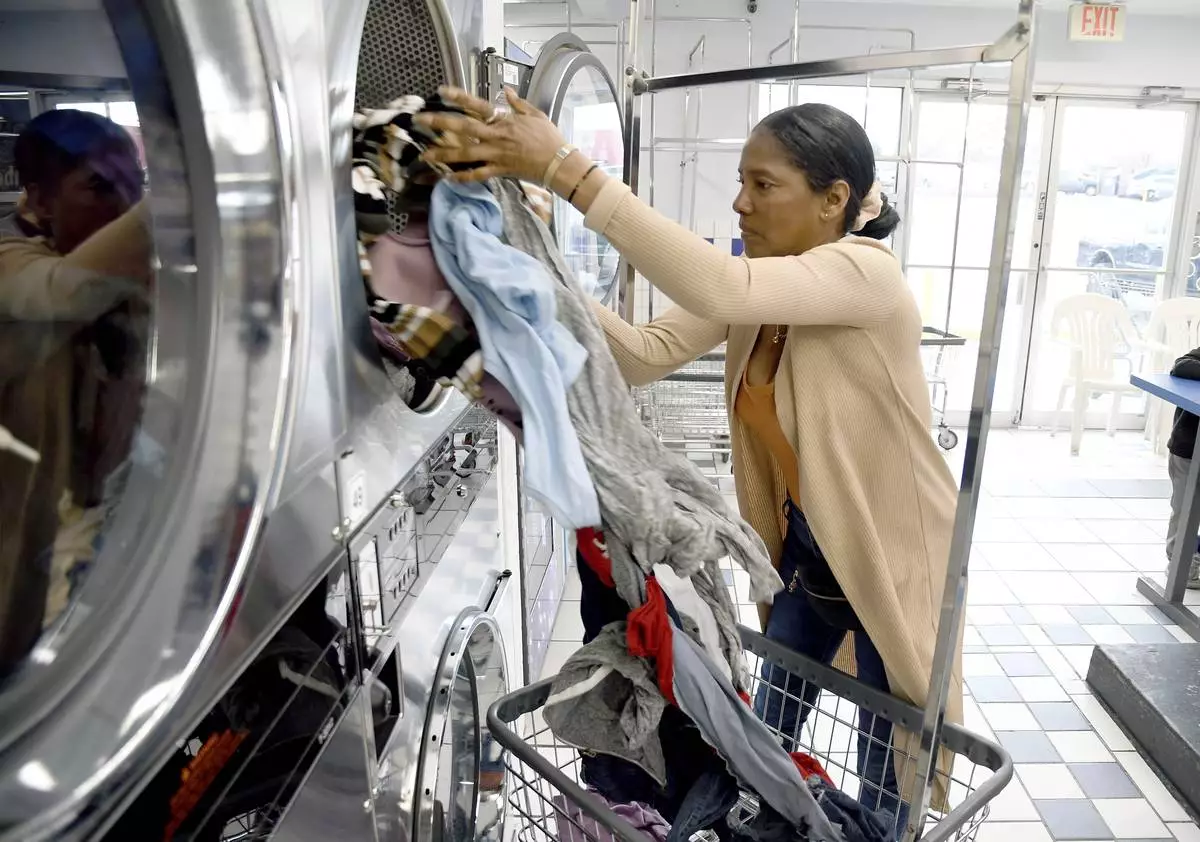
Sofia Roca, an immigrant from Colombia, washes clothes at a laundromat in Aurora, Colorado, on March 29, 2024. (AP Photo/Thomas Peipert)
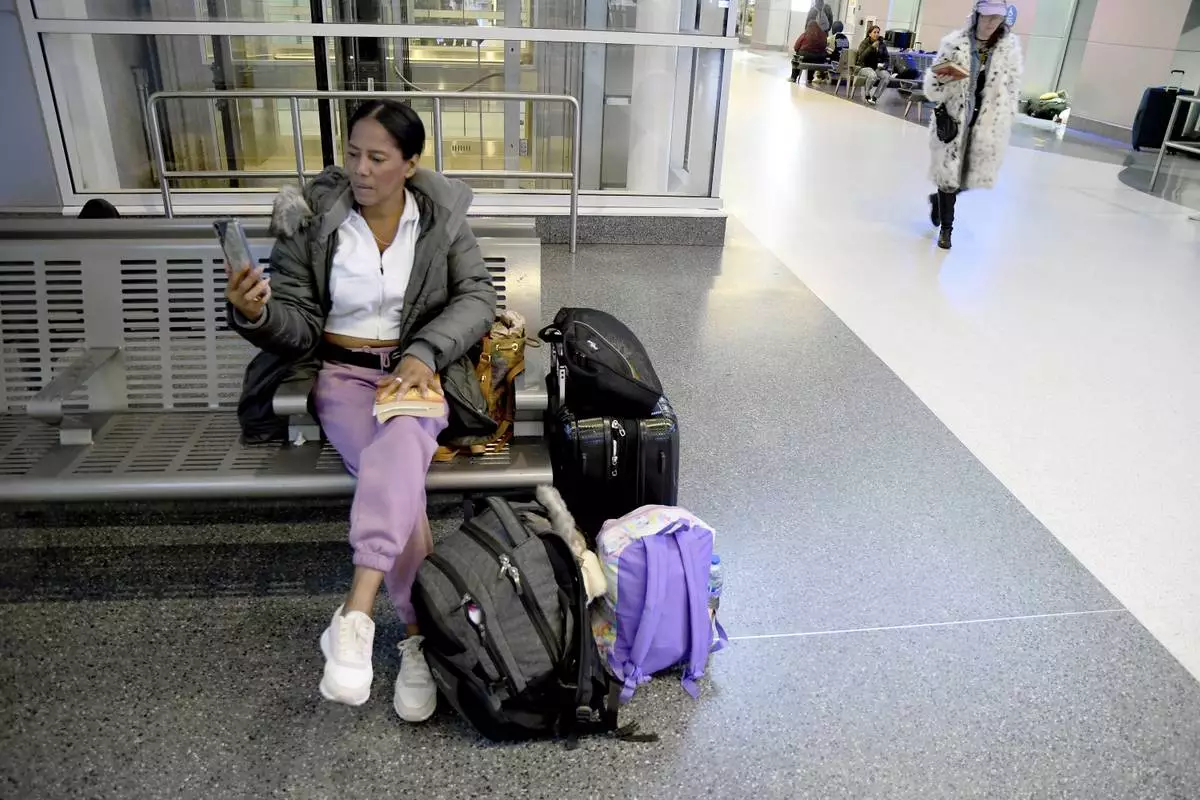
Sofia Roca, an immigrant from Colombia, prepares to leave Aurora, Colorado, on March 29, 2024. (AP Photo/Thomas Peipert)
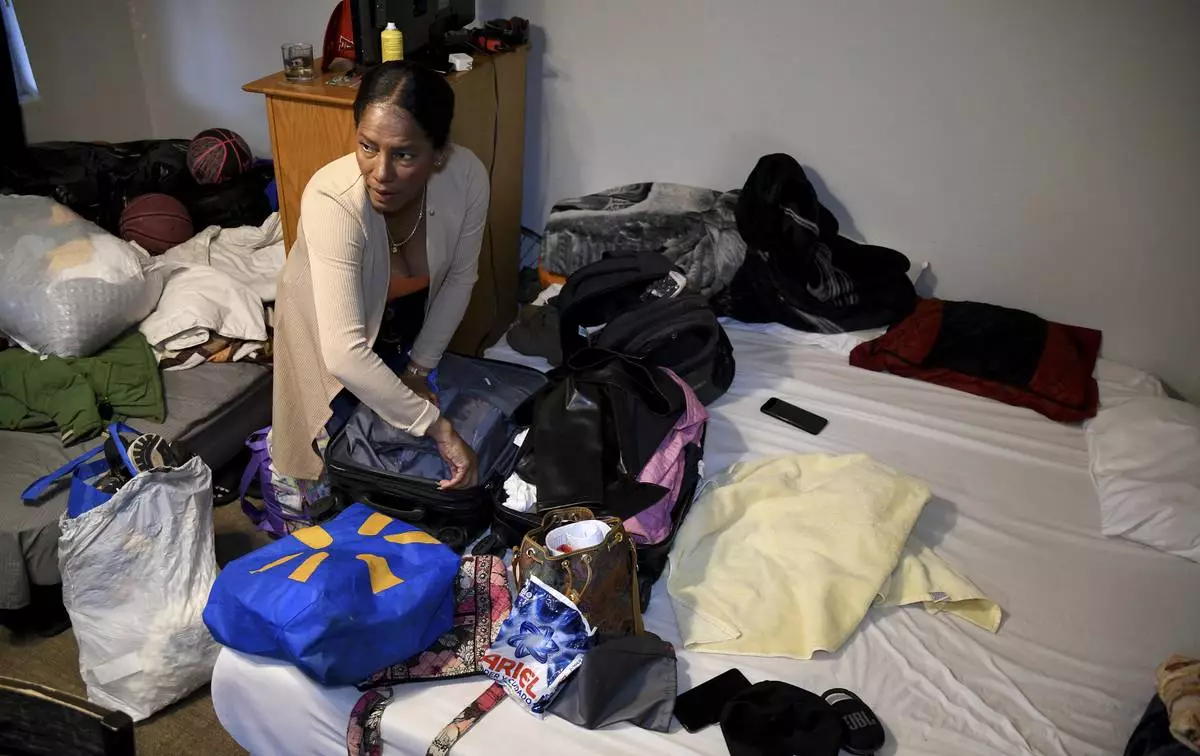
Sofia Roca, an immigrant from Colombia, packs up her belongings in Aurora, Colorado, on March 29, 2024, as she prepares to leave in search of work in another state. (AP Photo/Thomas Peipert)

Sofia Roca packs up her belongings on March 29, 2024. Many immigrants have been lured to Aurora, Colorado, by cheaper rent and abundant Spanish speakers, but finding a job and an affordable place to stay has been anything but easy. (AP Photo/Thomas Peipert)
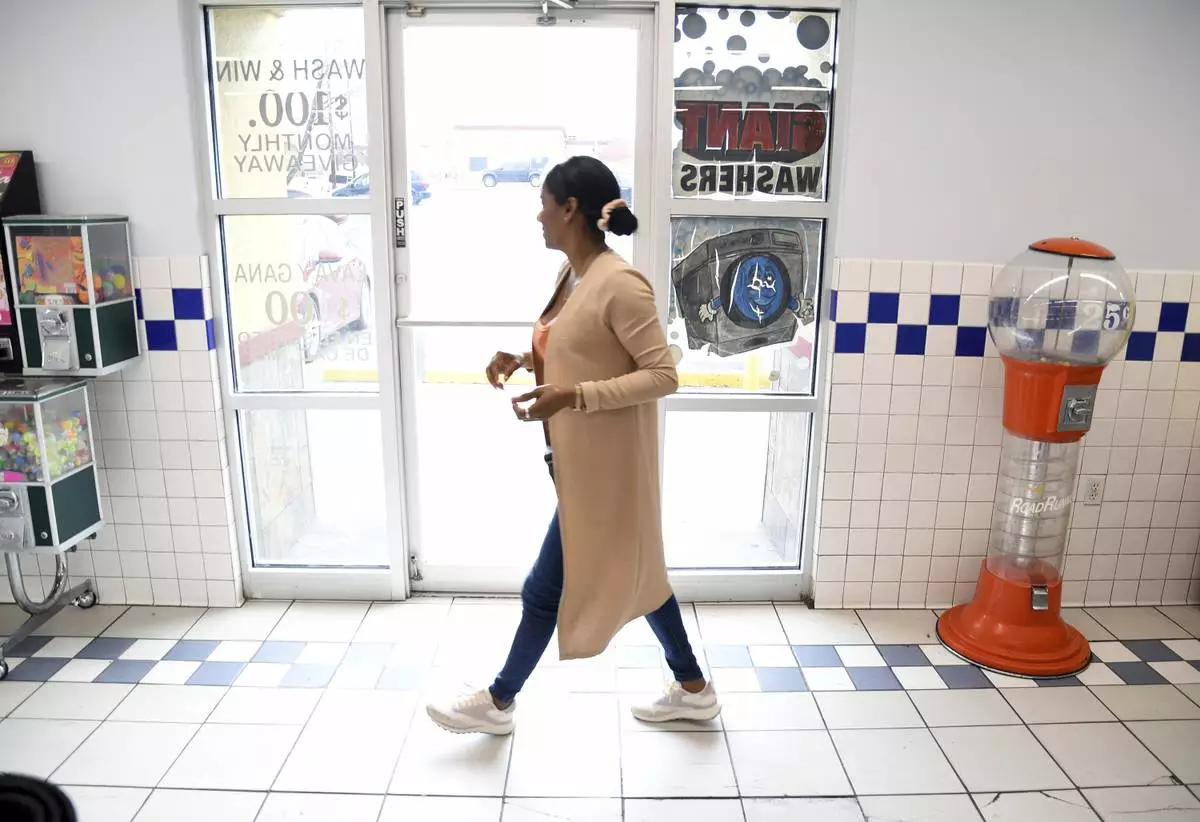
Sofia Roca, an immigrant from Colombia, washes clothes at a laundromat in Aurora, Colorado, on March 29, 2024. (AP Photo/Thomas Peipert)
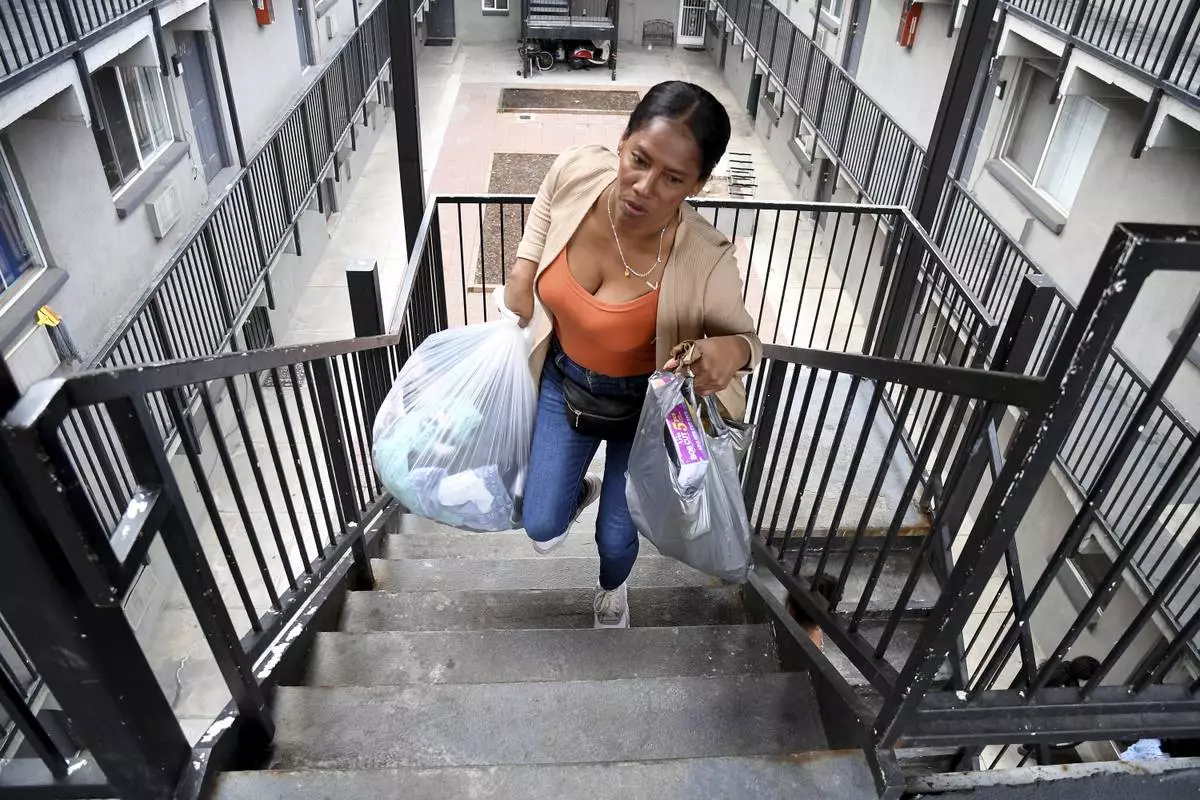
Sofia Roca, a 49-year-old immigrant from Colombia, climbs a stairway inside her apartment complex in Aurora, Colo., on March 29, 2024. (AP Photo/Thomas Peipert)

Sofia Roca, an immigrant from Colombia, washes clothes at a laundromat in Aurora, Colorado, on March 29, 2024. (AP Photo/Thomas Peipert)
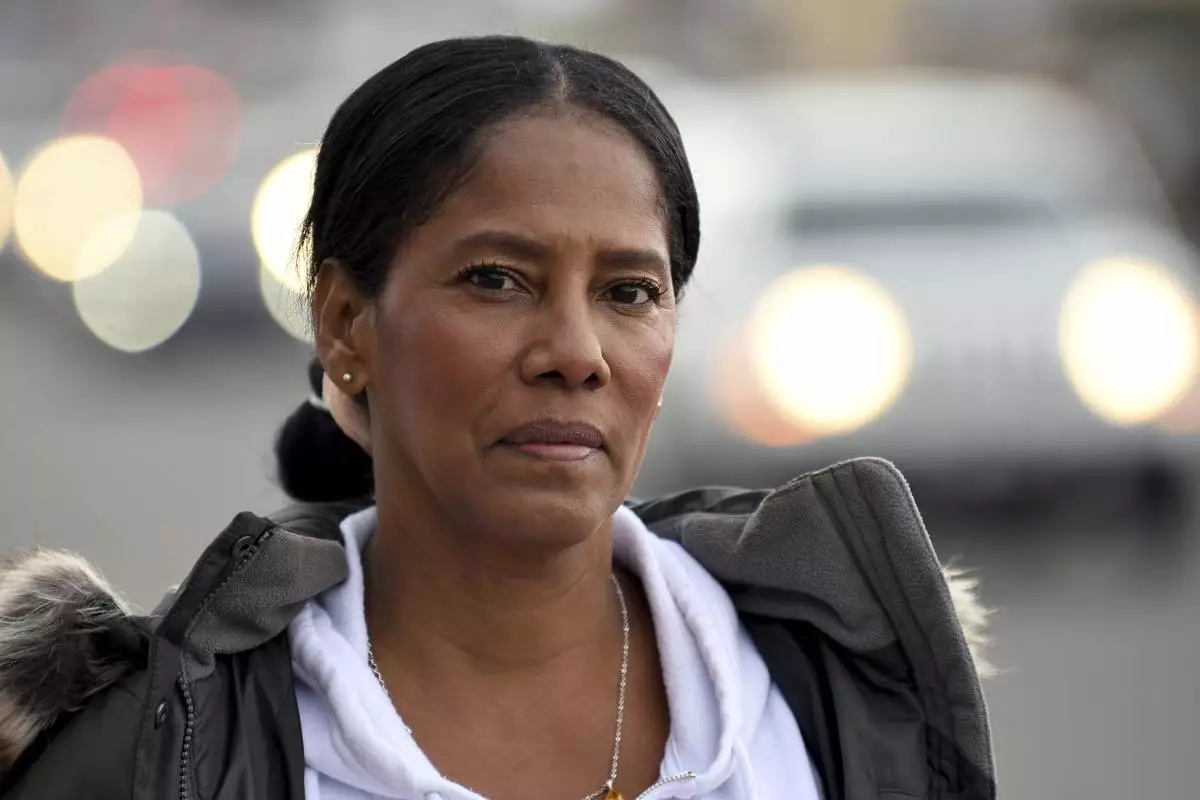
Sofia Roca, poses for a portrait on March 29, 2024, as she prepares to leave Aurora, Colorado, in search of more reliable work in another state. (AP Photo/Thomas Peipert)
ST. MORITZ, Switzerland (AP) — Lindsey Vonn was not about to put everything on the line in her first World Cup race back after more than five years of retirement.
Not with her history of crashes and injuries.
Not with her new titanium knee.
Not at age 40.
Vonn took a low-risk approach and finished 14th in a super-G on Saturday, crossing 1.18 seconds behind Austrian winner Cornelia Huetter.
“This was the perfect start,” Vonn said. “Today is just the first step and I’m not looking for more. Today I really needed to get to the finish. I wanted to have a solid result. And that’s exactly what I did.
“There’s definitely a lot that I have left to give," Vonn added. "Today was not the day to try to do anything special.”
Still, when Vonn came down, the crowd of Swiss-flag-waving fans turned silent in anticipation and all of the other top skiers watched her run on a perfectly clear day in the Alps.
“To have her back on the world stage is just fantastic,” said Sophie Goldschmidt, president and CEO of U.S. Ski and Snowboard. “Just the attention she’s bringing to the sport and the role model she is — it’s a big day.
“These kind of moments transcend outside of just sports. We see it with Mikaela (Shiffrin) and what she’s done recently, which is just superhuman as well, setting all those records."
Vonn lost time early in her run but nearly matched the top finishers in the middle and bottom section of the Corviglia course.
When she reached the finish and saw her time, Vonn flashed a wide smile and waved to the crowd.
“I didn’t risk anything with the line. I was a little bit conservative in some sections, but overall I skied really well. Now I just need my top section to be a little faster and I’ll be in really good shape,” said Vonn, who is planning to race another super-G in St. Moritz on Sunday.
Vonn finished less than a second off the podium, which also included Olympic champion Lara Gut-Behrami in second place, 0.18 behind Huetter, and Sofia Goggia in third, 0.33 back.
“I’m really close to being there," Vonn said. "I’m just not quite there yet.”
Vonn started No. 31 under a new wild card rule for former champions. But that still meant going after all of the current top-ranked skiers had raced.
“The course was a little bit bumpy when I went and so some sections I was a little bit more conservative with my line," she said. “But in some sections I was really fast.”
Vonn had to cut her career short in 2019 due to a series of crashes and injuries, but then she had knee replacement surgery in April and had two titanium pieces inserted into her right knee. Her knee feels better than it has in years, so she decided to come back.
“The last few years of my career were so much different than they are right now," Vonn said. "I’m skiing without thinking about my knee, which I really haven’t done since I first tore my ACL in 2013. So it’s been a long time that I felt this good and I’m a little bit older, but honestly, I’m a hell of a lot stronger than I once was.”
Eight-time overall World Cup champion Marcel Hirscher also took advantage of the wild card rule and returned this season after five years away. But then Hirscher tore his left ACL while training in giant slalom and announced earlier this month that his comeback season was done.
Vonn left the tour with 82 World Cup wins — the record for a woman at the time and within reach of the then all-time Alpine mark of 86 held by Swedish standout Ingemar Stenmark. The women’s record held by Vonn was eclipsed last year by Shiffrin, who now has an outright record 99 wins.
Shiffrin, who shares the record of five wins in St. Moritz with Vonn, isn’t racing this weekend as she recovers from abdominal surgery to clean out a puncture wound she sustained in a crash last month.
Vonn is attempting to enter unchartered territory in terms of success at an advanced age in women’s skiing.
The oldest woman to win a World Cup race was Federica Brignone, the Italian who won the giant slalom in Soelden, Austria, in October to start this season, at age 34.
“It’s super impressive,” said Vonn’s U.S. teammate Jacqueline Wiles, noting that Vonn didn’t have as much preseason preparation as other skiers. “If anybody could do it, she could. The more she gets comfortable and gets kind of back up to speed, she’s going to be right in there.”
So will Vonn charge harder on Sunday?
“Step by step,” Vonn said. “Patience.”
AP skiing: https://apnews.com/hub/alpine-skiing

Sofia Goggia of Italy, left, and Lindsey Vonn of United States of America, talk with journalists after completing an alpine ski, women's World Cup super G, in St. Moritz, Switzerland, Saturday, Dec. 21, 2024. (Jean-Christophe Bott/Keystone via AP)

United States' Lindsey Vonn, takes a selfie in the finish area after completing an alpine ski, women's World Cup super G, in St. Moritz, Switzerland, Saturday, Dec. 21, 2024. (Jean-Christophe Bott/Keystone via AP)

United States' Lindsey Vonn, right, smiles after completing an alpine ski, women's World Cup super G, in St. Moritz, Switzerland, Saturday, Dec. 21, 2024. (Til Buergy/Keystone via AP)

United States' Lindsey Vonn competes in an alpine ski, women's World Cup super G, in St. Moritz, Switzerland, Saturday, Dec. 21, 2024.(Jean-Christophe Bott/Keystone via AP)

United States' Lindsey Vonn, right, smiles after completing an alpine ski, women's World Cup super G, in St. Moritz, Switzerland, Saturday, Dec. 21, 2024. (Til Buergy/Keystone via AP)

Italy's Sofia Goggia, left, hugs United States' Lindsey Vonn after Vonn competed in an alpine ski, women's World Cup super G, in St. Moritz, Switzerland, Saturday, Dec. 21, 2024. (AP Photo/Giovanni Auletta)

United States' Lindsey Vonn celebrates at the finish area of an alpine ski, women's World Cup super G, in St. Moritz, Switzerland, Saturday, Dec. 21, 2024. (AP Photo/Giovanni Auletta)

United States' Lindsey Vonn competes in an alpine ski, women's World Cup super G, in St. Moritz, Switzerland, Saturday, Dec. 21, 2024. (AP Photo/Marco Trovati)

United States' Lindsey Vonn celebrates at the finish area of an alpine ski, women's World Cup super G, in St. Moritz, Switzerland, Saturday, Dec. 21, 2024. (AP Photo/Giovanni Auletta)

United States' Lindsey Vonn, right, is congratulated by Red Bull Head of Athletes Special Projects Patrick Riml after she competed in an alpine ski, women's World Cup super G, in St. Moritz, Switzerland, Saturday, Dec. 21, 2024. (AP Photo/Giovanni Auletta)

United States' Lindsey Vonn celebrates at the finish area of an alpine ski, women's World Cup super G, in St. Moritz, Switzerland, Saturday, Dec. 21, 2024. (AP Photo/Giovanni Auletta)

United States' Lindsey Vonn celebrates at the finish area of an alpine ski, women's World Cup super G, in St. Moritz, Switzerland, Saturday, Dec. 21, 2024. (AP Photo/Giovanni Auletta)

United States' Lindsey Vonn, right, smiles after completing an alpine ski, women's World Cup super G, in St. Moritz, Switzerland, Saturday, Dec. 21, 2024. (Til Buergy/Keystone via AP)

United States' Lindsey Vonn looks on before competing in an alpine ski, women's World Cup super G, in St. Moritz, Switzerland, Saturday, Dec. 21, 2024. (AP Photo/Giovanni Auletta)

United States' Lindsey Vonn looks on before competing in an alpine ski, women's World Cup super G, in St. Moritz, Switzerland, Saturday, Dec. 21, 2024. (AP Photo/Giovanni Auletta)

United States' Lindsey Vonn looks on before competing in an alpine ski, women's World Cup super G, in St. Moritz, Switzerland, Saturday, Dec. 21, 2024. (AP Photo/Giovanni Auletta)

United States' Lindsey Vonn does a course inspection before competing in an alpine ski, women's World Cup super G, in St. Moritz, Switzerland, Saturday, Dec. 21, 2024. (AP Photo/Marco Trovati)

United States' Lindsey Vonn concentrates during the course inspection before competing in an alpine ski, women's World Cup super G, in St. Moritz, Switzerland, Saturday, Dec. 21, 2024. (AP Photo/Marco Trovati)

United States' Lindsey Vonn concentrates during the course inspection before competing in an alpine ski, women's World Cup super G, in St. Moritz, Switzerland, Saturday, Dec. 21, 2024. (AP Photo/Marco Trovati)













